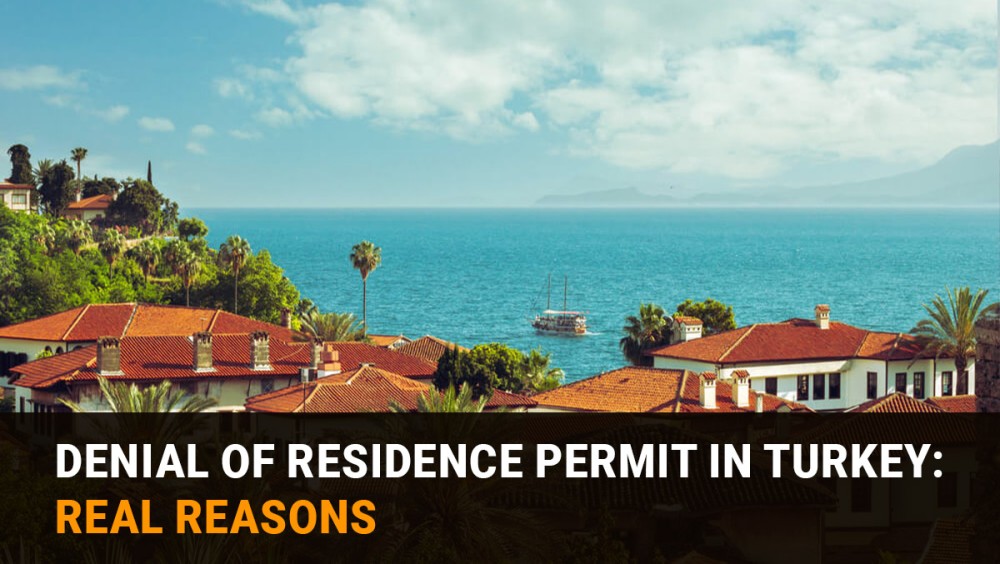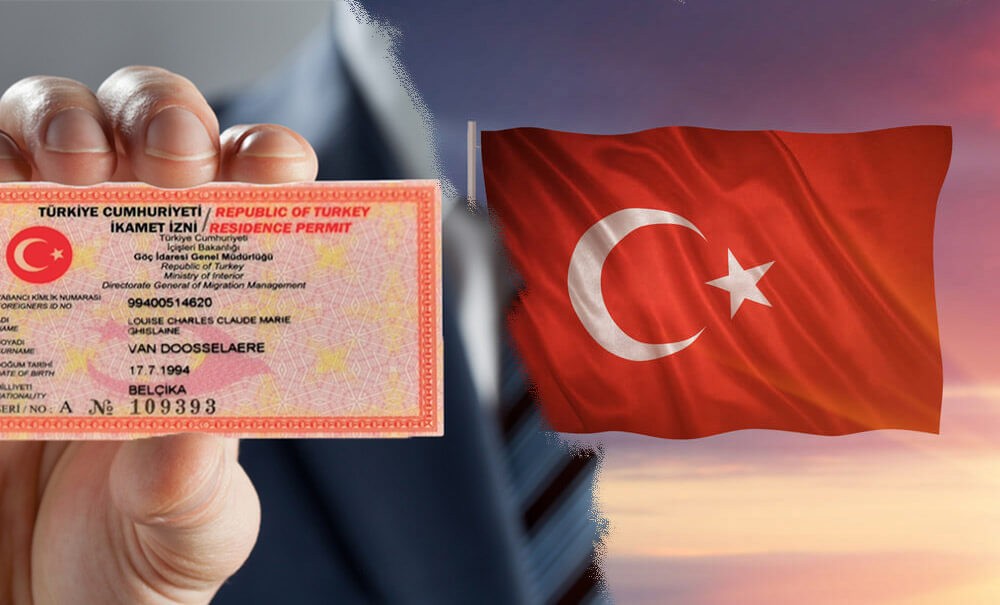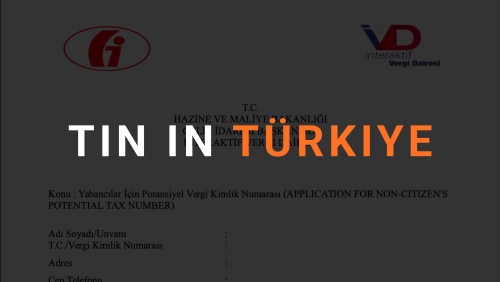Denial of Residence Permit in Turkey: Real Reasons


Obtaining a residence permit in Turkey is an important step for foreign citizens planning to live, invest or work in this country. However, recently the requirements of the migration authorities have become noticeably stricter, and the number of refusals has increased significantly.
In order to avoid mistakes and not waste time and money, it is important to understand in advance what reasons most often become the basis for refusal. In this material, we will examine in detail why a Turkish residence permit is refused, consider the key factors that the Migration Directorate pays attention to, and what to do if the application for a residence permit is still rejected.

Main reasons for being denied a residence permit in Turkey
Most of the Turkish residence permit denials today are related to Article 32 of Law No. 6458 "On Foreigners and International Protection" . This raises a lot of questions for those who previously extended their tourist residence permit under a lease agreement without any problems and suddenly faced a rejection. Why did something that worked for years cease to be a legal basis starting from the beginning of 2023?
To understand this, let us turn to the original source - Article 32 of the said law, which describes the conditions for issuing a short-term residence permit in Turkey.
According to the law, a foreigner must:
have one or more grounds provided for in Article 32 (for example: tourism, treatment, education, owning real estate, taking language courses, etc.);
not fall under the conditions of deportation specified in Article 7;
provide information about a place of residence that meets sanitary and legal standards;
if necessary, present a certificate of no criminal record;
confirm your current residential address in Turkey.
The main factor in the denial of a residence permit in Turkey is paragraph A of Article 32 - the lack of justified reasons for issuing a residence permit. Consequently, Article 32 has become an instrument for tightening Turkey's migration policy and is used to prevent abuses with short-term residence permits.
In practice, the reasons for refusing to issue a Turkish residence permit may be related to documents or, for example, to questionable motives for staying. Often, even minor errors or inaccuracies become a reason for rejecting an application. Let's consider each of the reasons in detail:
Errors in document preparation and incomplete set of documents.
The most common reason for refusal is incomplete or incorrectly prepared documentation. For example, the applicant may provide a copy of the lease agreement without notarization or forget to attach a certificate of income. If any documents are missing, the Migration Service gives 30 days to submit them. After this period, the application is cancelled.
Having a valid medical insurance policy is another mandatory requirement for obtaining a residence permit. It is important that the insurance covers the entire period of stay and is issued by an accredited company.
False information.
If false data is found when submitting an application, this is considered a serious violation. In the case of using false or counterfeit documents, a foreigner will not only be denied a residence permit, but will also be banned from entering the republic.
Weak or unconvincing purpose of stay.
The Turkish Immigration Directorate requires a clearly stated purpose of stay, supported by evidence. For example, if an applicant applies for a residence permit to travel around the country, but does not have a clearly stated tourist plan and return tickets, this will raise suspicions. The authorities may consider that the foreigner is hiding his real motives - for example, the intention to get an illegal job.
Insufficient income level.
Financial solvency is one of the key factors for obtaining a Turkish ikamet. The applicant must prove that he or she is able to support himself or herself and his or her family members for as long as the permit is valid. The acceptable amount is no less than one and a half times the minimum wage in Turkey per month for the entire period of stay. If the Migration Department finds that the applicant does not have enough money to live in Turkey, he or she will be refused.
Violations of visa regulations or migration rules.
If the applicant has previously exceeded the permitted period of stay in the country, has a bad visa history and has received administrative fines for illegal stay, this is taken into account when considering the application. Previous refusals also play a negative role, especially if their reasons are repeated.
Criminal records and violation of the law.
Those with outstanding criminal records are automatically refused. In addition, Türkiye can exchange information with other countries, and the presence of an entry ban or legal problems abroad also influence the decision of the migration authorities.
Suspicions of fictitious residence and unsuitable living conditions.
Migration authorities pay special attention to cases where a person does not live at the address specified in the application, or the lease is formal - only for documents. If during the visit it turns out that the applicant does not live there, or the living conditions are unsatisfactory, this will lead to the cancellation of the already issued residence permit.
Living in areas closed to residence permits.
Since 2022, the Turkish authorities have limited the issuance of residence permits in areas where the proportion of foreigners has exceeded the established threshold. When submitting documents for an initial permit for rent or as an owner of real estate in such an area, the application will be rejected regardless of other factors.

How to avoid being denied a Turkish residence permit: useful recommendations
How to avoid rejection after applying for a Turkish residence permit? It is necessary to comply with the requirements of migration legislation and take into account the following key aspects:
Before filling out an application for a residence permit, be sure to pre-check all documents with a specialist or migration consultant. Pay attention to the validity periods, notarizations, correctness of the translation and relevance of each document. The lease agreement is especially important: it should be registered with a notary and the address registration system (Nüfus).
All documents must be real and verifiable. Consult with a lawyer who will help you collect legal evidence of your grounds.
Eliminate the possibility that your intentions may be regarded by immigration officials as unclear or suspicious. Justify the purpose of your stay in Turkey as clearly as possible. If you are planning a long-term stay, it is better to choose the reason “purchase of real estate” or, for example, “family reunification”, supporting the application with relevant evidence.
Proof of income is mandatory when applying for a residence permit and can be provided in the form of bank statements, salary certificates, tax returns or passive income (rent, interest, pension). It is important that the funds are available in your bank account.
If you had expired visas or fines, attach receipts for their payment. When re-applying for a residence permit, you can supplement the package with an explanatory letter, focusing on the correction of previous violations. In such a situation, it would be a good idea to talk to a lawyer who will help present your case correctly and reduce the risks of refusal.
If you have a criminal record that has been expunged, it is also extremely important to consult with a specialist in advance - not every criminal record automatically means a refusal. The nature of the offense, the statute of limitations, and the documents on the execution of the sentence are of decisive importance.
Always register at your actual place of residence and keep evidence - bills in your name, photos of the apartment, correspondence with the landlord. If you change your address - immediately notify the Migration Service about it.
Before renting or buying a home, be sure to consult with a real estate agent and check the area through the official database of closed zones on the website of the Immigration Office (Göç İdaresi).
Residence Permit Denial: What to Do
What to do if your Turkish residence permit is denied? After your application is rejected, it is important to take the following steps:
Find out the reason for the refusal. The official notice or Tebliğ formu is sent to the registered address. Only the Tebliğ formu is the only legal notice of the refusal of the request. The document states the reasons for the decision taken. Understanding the reason for the refusal will help to adjust the subsequent actions.
Meet the exit deadlines. From the moment you receive the official notification, you have 10 calendar days to leave Turkey. Failure to do so may result in fines and a temporary ban on re-entry.
Appeal the decision. If you believe that the refusal is unfounded, you have the right to appeal to the Turkish administrative court within 60 calendar days from the date of receipt of the notice. Filing an application to suspend the execution of the decision within the first 10 days from the date of refusal may allow you to remain in the republic during the trial. But you should not resolve such issues on your own - this can only worsen the situation. It is better to seek help from an experienced Turkish lawyer.
Re-apply. If you have been refused on a specific basis, you can re-apply for the same type of residence permit after six months. However, if you change the reason for issuing a residence permit (for example, you decide to purchase housing instead of tourism), you will again have the right to re-apply without waiting for this period.
Consult with experts. We recommend that you contact migration law specialists or lawyers to correctly assess the situation, prepare the necessary documents and choose the best way to solve the problem.
A timely and correct response to a refusal, as well as compliance with established procedures and deadlines will help you minimize negative consequences and increase your chances of obtaining a residence permit in the future.
Checklist: What you should consider to successfully obtain a residence permit
Key points to remember for those who want to successfully obtain a Turkish residence permit:
A short-term Turkish residence permit can be issued for a period of six months to three years.
Türkiye provides various types of short-term residence permits according to the purpose of stay, such as tourism, study, work, treatment or purchase of real estate. A clear definition of the purpose will help to choose the right tactics of action and collect the appropriate package of documents.
The standard list of documents for a Turkish residence permit includes: a completed and printed application form, tax identification number, biometric photographs, a notarized copy of a foreign passport, income certificate, health insurance, and statements of payment of administrative fees and taxes. Depending on the reason, additional papers are attached to the package. For example, for property owners, this is a TAPU.
The most common reasons for refusals are: not having all the required documents or filling them out incorrectly, suspicious reasons for legalization in Turkey, violation of migration rules or insufficient financial savings for the entire period of residence.
In case of refusal of a residence permit, if you are sure that the decision is unfounded, you can go to court and defend your right to live in the country for a long period. In addition, foreign residents have the opportunity to choose another basis for obtaining a Turkish ikamet.
The most win-win option for obtaining a residence permit is if a foreign applicant has TAPU or property rights to apartments in Turkey with a cadastral value of USD 200,000. This format confirms the legal right to reside and demonstrates the financial solvency of the applicant, which has a positive effect on the decision of the migration authorities.
Altop Real Estate helps its clients choose real estate that fully meets the requirements for obtaining a residence permit, and also provides support in preparing documents and submitting an application. The experience of the agency's specialists will allow you to go through the procedure confidently and without unnecessary stress.


